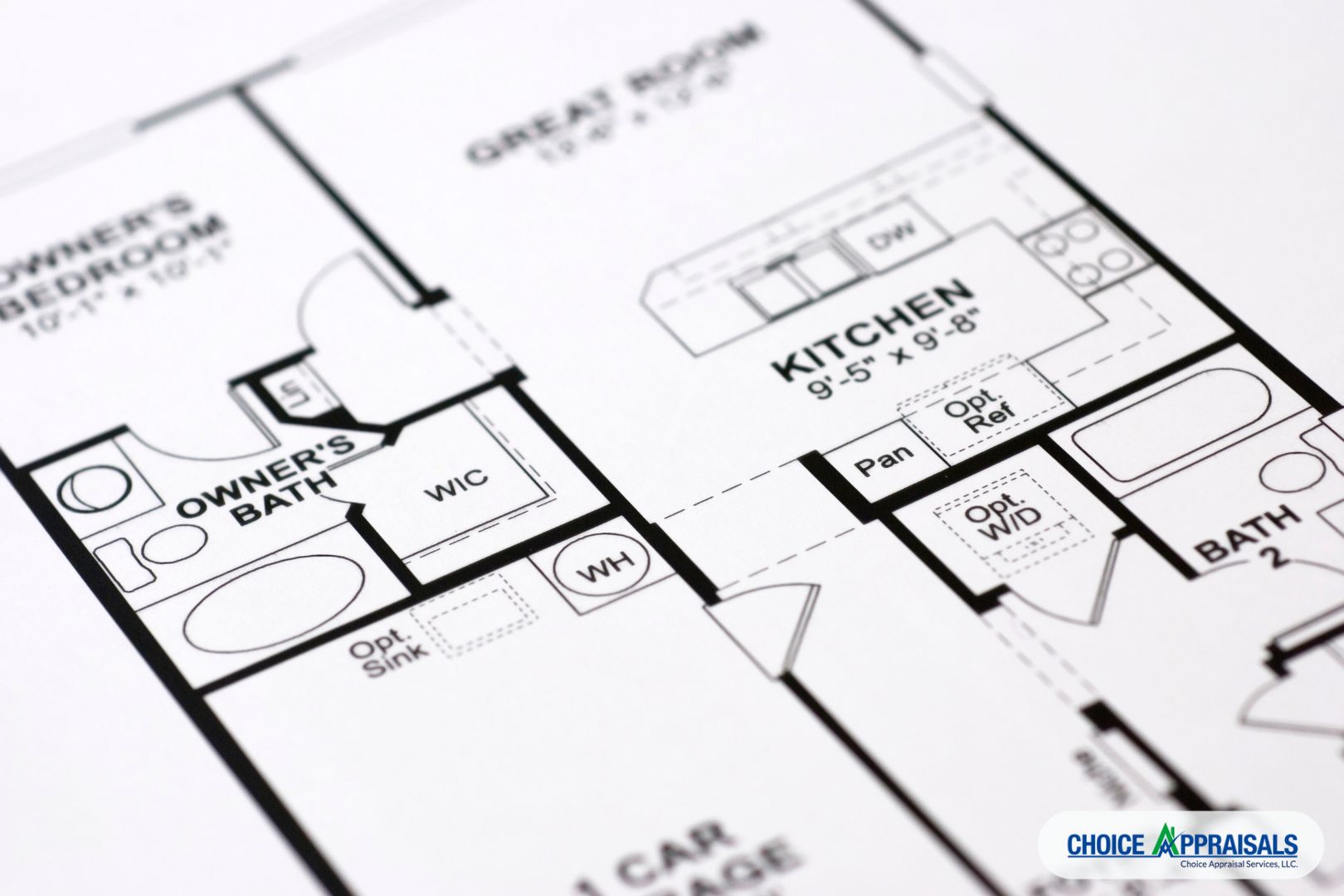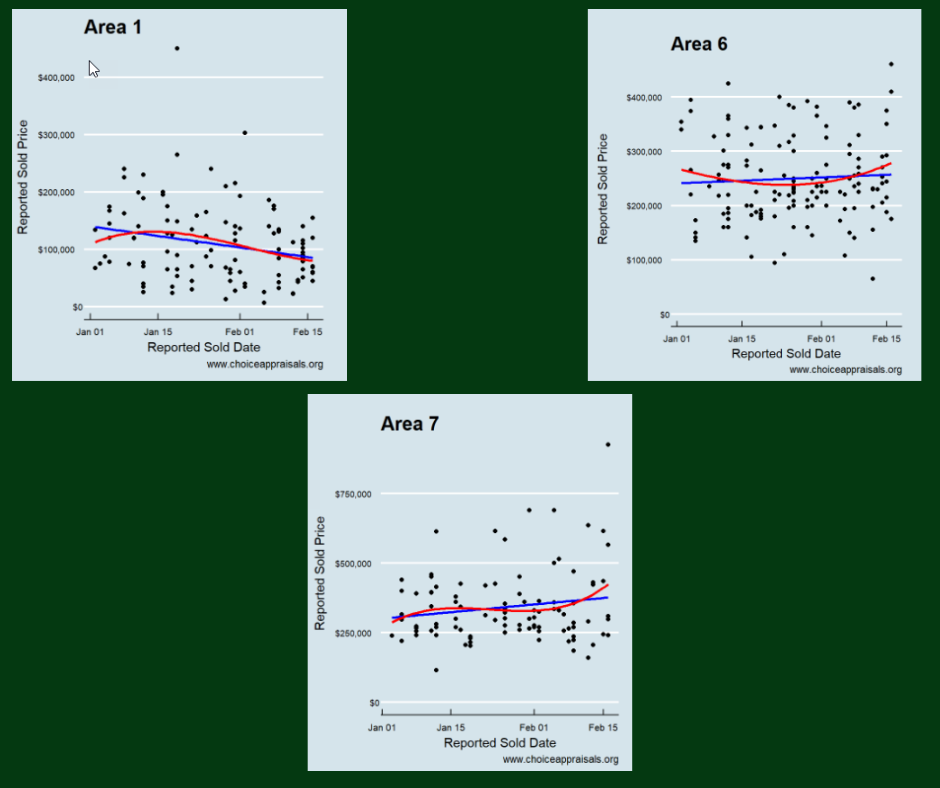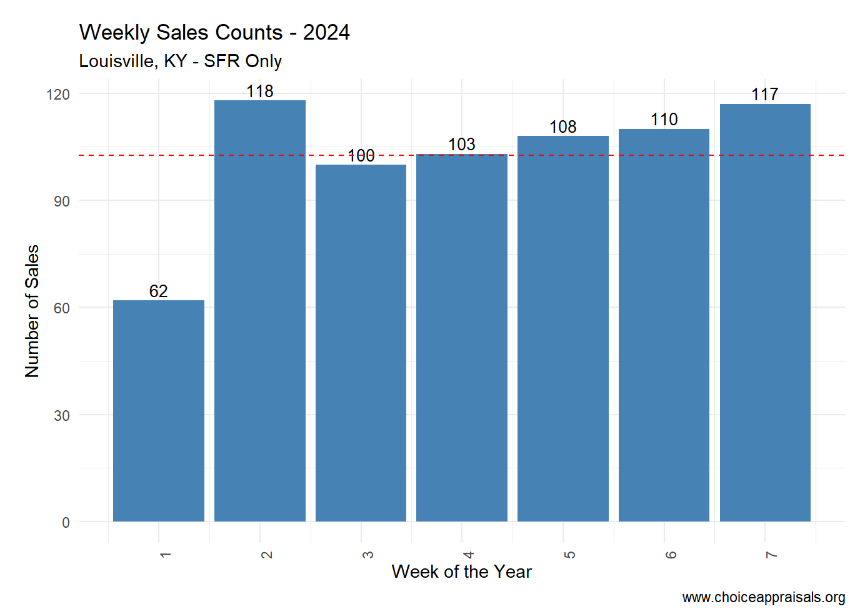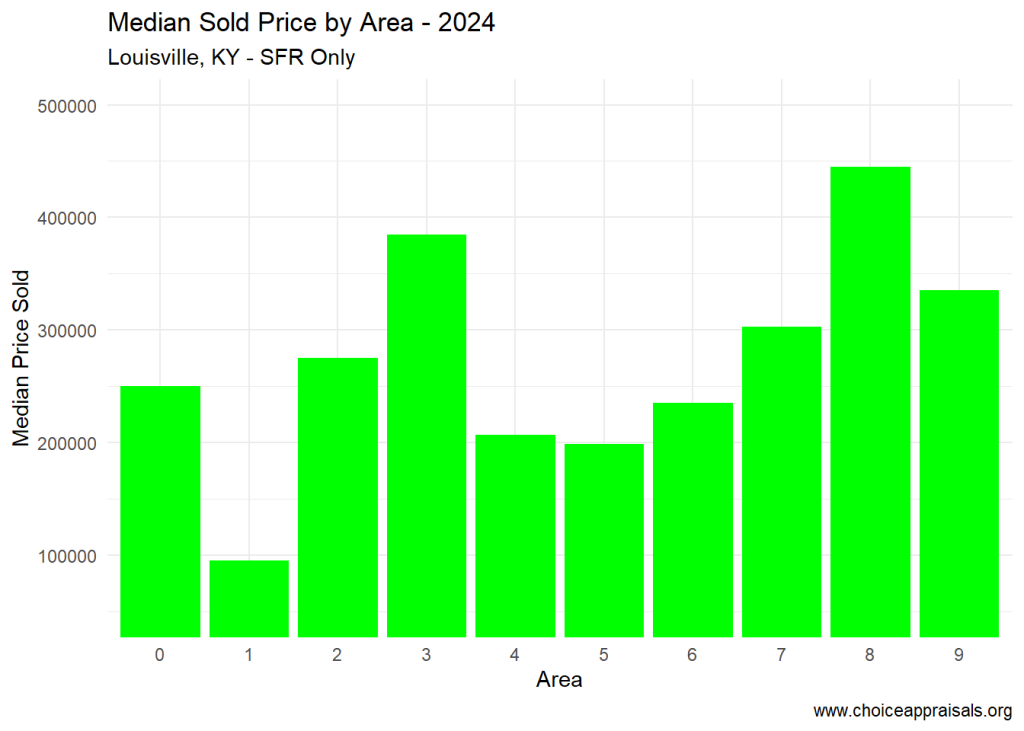by Conrad Meertins | Aug 6, 2024 | Valuation

In the fast-paced (sometimes slow-paced) world of real estate, determining your property’s value is crucial to making informed decisions. Whether you’re selling, buying, or refinancing, understanding your property’s worth can significantly impact your financial outcomes.
This leads to the question: should you rely on a Comparative Market Analysis (CMA) or a Pre-listing Appraisal Report?
Both CMAs and pre-listing appraisals offer valuable insights into property valuation, yet they serve distinct purposes and rely on different methodologies.
This post will examine the key differences between these two approaches, highlighting their unique strengths and offering guidance on when to use each tool effectively.
By the end of this read, you’ll be equipped with the knowledge to choose the best option for your real estate needs, ensuring a strategic approach to your property’s valuation.
Understanding Comparative Market Analysis (CMA)

In the world of real estate, a Comparative Market Analysis (CMA) is a vital tool for both buyers and sellers. It offers a snapshot of the local market, allowing homeowners to gauge the potential selling price of their property. But what exactly is a CMA, and how does it work?
Definition
According to Investopedia, “A comparative market analysis (CMA) estimates a home’s price based on recently sold, similar properties in the immediate area.”
Real estate agents and brokers generate CMA reports to assist sellers in setting competitive listing prices and to help buyers make informed offers. These reports rely on data from homes similar to the subject to paint a picture of the current market conditions.
Key Features
CMAs primarily focus on selecting homes comparable to the subject property. Real estate agents utilize a mix of recent sales, active listings, and expired listings to establish a competitive price range.
This analysis is rooted in real-time market data, reflecting the dynamic nature of real estate. By examining similar properties in terms of size, location, condition, and features, agents can craft a well-rounded estimate of the property’s market value.
Key Elements of a CMA:
-
- Recent Sales: Provides a baseline of what buyers are willing to pay for similar properties.
-
- Active Listings: Shows the current competition and helps position the property strategically.
-
- Expired Listings: Offers insights into price points that didn’t attract buyers, aiding in avoiding overpricing pitfalls.
Strengths
CMAs are particularly valued for their quick and cost-effective nature. They allow real estate agents to set initial listing prices efficiently, which can be crucial in fast-moving markets.
The strengths of CMAs lie in their ability to attract potential buyers by offering a competitive price right from the start. By making informed pricing decisions based on data and trends, agents can enhance the appeal of the property to potential buyers.
Ideal Scenarios for CMAs
CMAs shine in scenarios where a homeowner needs a quick assessment of their property’s market position. They are most effective in areas where properties share similarities, allowing for more accurate comparisons.
Additionally, when an agent’s local expertise can be leveraged, a CMA becomes an invaluable tool in crafting a market strategy that resonates with prospective buyers.
When to Use a CMA:
-
- Quick Assessments: Ideal for sellers needing a rapid overview of market conditions and pricing.
-
- Homogeneous Markets: Effective in neighborhoods with similar properties, providing reliable comparative data.
-
- Agent Expertise: Leveraging an agent’s knowledge of the local market nuances can refine CMA results.
Example Scenario
Imagine a homeowner in a suburban neighborhood with many similar three-bedroom houses. They decide to sell their home and need to determine a competitive asking price.
A CMA allows their real estate agent to quickly analyze recent sales and active listings in the area, providing the homeowner with a realistic price range to attract buyers. This swift analysis ensures the property is neither underpriced nor overpriced, maximizing the chance for a successful sale.
Exploring Pre-listing Appraisal Reports

While Comparative Market Analyses (CMAs) provide a quick snapshot of the real estate landscape, pre-listing appraisals offer a more detailed and structured valuation. For homeowners seeking precision, especially in complex scenarios, understanding the benefits of a pre-listing appraisal is crucial.
Definition
A pre-listing appraisal is a comprehensive valuation conducted by a licensed appraiser, designed to provide an in-depth analysis of a property’s market value before it hits the market.
Unlike CMAs, which are typically performed by real estate agents, appraisals are carried out by licensed professionals who adhere to rigorous standards of USPAP (Uniform Standards of Professional Appraisal Practice) to assess a property’s worth accurately.
Key Features
Market Analysis
Appraisal reports delve deeply into the subject’s market, evaluating trends such as increasing, stable, or declining sold home rates.
Each appraisal report includes a thorough market analysis, offering a broader perspective that accounts for economic factors, local developments, and other market influences. This comprehensive approach ensures that the property’s valuation is well-grounded in the current market context.
Adjustments
Appraisers conduct meticulous analyses to adjust for differences between the subject property and comparable sales. This involves accounting for unique features, such as extra square footage, high-end finishes, or custom-built amenities, providing a more precise valuation.
Adjustments are made to ensure the subject property is accurately compared to others, considering all aspects that may affect its value. It should be noted that appraisal reports are required to have support for how all of its adjustments were derived.
Comparable Selection Criteria
Unlike CMAs, appraisal reports are bound by stringent requirements. Financial institutions often require appraisers to “bracket” the subject’s features, ensuring a balanced and accurate comparison.
This process involves selecting comparables that have slightly more or less desirable features than the subject, thereby offering a more reliable valuation metric (this is only done when the feature in question cannot be matched exactly by a comparable sale).
This bracketing technique helps demonstrate the acceptability of certain features within the market, reinforcing the appraiser’s conclusions. For example, if the subject has a 5 car garages. If a comparable cannot be found with a 5 car garage, at least one with less than five cars and one with more than 5 cars would be included.
Strengths
Pre-listing appraisals are known for their precision and credibility. They provide a detailed property value assessment that can be crucial in setting a realistic list price, especially in unique markets or for high-value properties.
The strengths of pre-listing appraisals lie in their ability to deliver objective, third-party evaluations that homeowners and buyers can trust.
Ideal Scenarios for Pre-listing Appraisals
Pre-listing appraisals shine in scenarios requiring accuracy and detail beyond what a CMA can provide. They are ideal for:
-
- Complex Properties: When a homeowner needs an accurate valuation for properties with intricate designs or multiple unique features.
-
- Unique Features: For properties with distinctive attributes where precise valuation is critical to avoid mispricing.
-
- Objective Assessments: In cases where an unbiased third-party evaluation aids in negotiation or helps prevent disputes during sales transactions.
Example Scenario
Consider a homeowner with a custom-built estate featuring specialized architecture, high-end materials, and unique exterior amenities – let’s say a tennis court. For such a property, a pre-listing appraisal is invaluable.
It accounts for all these distinct elements, providing a precise valuation that reflects its true market value. This detailed assessment not only assists in setting the right price but also supports negotiations, ensuring the seller maximizes their property’s worth.
Having explored the intricacies of pre-listing appraisals and their critical role in accurately valuing complex properties, it becomes evident that both CMAs and appraisals offer unique advantages depending on the situation.
In the next section, we’ll conduct a detailed comparison of CMAs and pre-listing appraisals, examining when and why each method should be employed. This comparison will further illuminate the distinct roles these tools play in real estate, helping you make informed decisions tailored to your specific needs.
Detailed Comparison of CMA and Pre-listing Appraisal Report

Choosing between a Comparative Market Analysis (CMA) and a pre-listing appraisal depends on the specific needs of the property owner and the nature of the real estate market.
Both tools provide valuable insights but differ significantly in their approach, depth, and application. This section highlights these differences to help you make informed decisions on when you may use each one.
Market Analysis
Appraisal Reports:
Appraisal reports offer a detailed market analysis that goes beyond the immediate scope of similar homes. They assess broader market trends, evaluate economic indicators, and consider local and regional factors that might influence property values.
This comprehensive analysis provides insights into how a property’s value fits within the larger market context, offering a more holistic view.
CMAs:
CMAs focus primarily on comparable homes, emphasizing recent sales data, active listings, and sometimes expired listings. While this approach effectively provides a snapshot of local market conditions, it may not delve into larger market trends extensively. CMAs rely heavily on the local expertise of real estate agents to interpret this data within the neighborhood context.
Adjustments
Appraisal Reports:
Appraisal reports are renowned for their meticulous adjustments, which account for differences between the subject property and comparable sales.
These adjustments consider factors like additional bathrooms, square footage, architectural features, and more. The process involves detailed analysis and support for how each adjustment was derived, ensuring that every valuation aspect is justified and precise.
CMAs:
In contrast, CMAs often use similar homes with minimal adjustments. The adjustments are generally based on the agent’s expertise and experience rather than extensive researched data.
While effective for initial pricing strategies, this method may lack the precision of an appraisal, especially in cases where unique property features significantly impact value.
Comparable Selection Criteria
Appraisal Reports:
Appraisal reports adhere to specific rules for selecting comparables, including bracketing features. This means choosing comparables that have both fewer and more features than the subject property.
For instance, if the subject property has a three-car garage, appraisers might select one comparable with a two-car garage and another with a four-car garage. This bracketing ensures a balanced comparison and highlights any unique market features, emphasizing that the property’s traits are not anomalies.
CMAs:
CMAs typically focus on recent sales within a specific area or subdivision, sometimes limiting the scope of comparison. While this can be sufficient for standard properties, it may not fully capture the nuances needed for properties with unique features or those located in diverse markets.
When to Use Each
CMA:
-
- Quick Assessments: When a speedy evaluation of the market is needed.
-
- Competitive Pricing: Useful for setting initial list prices in standard neighborhoods in stable markets.
-
- Agent Expertise: Leverages local knowledge and market conditions.
Pre-listing Appraisal:
-
- Precise Valuations: Essential for detailed and accurate property assessments.
-
- Complex Properties: Ideal for unique or high-value properties requiring detailed analysis including market trend analysis.
-
- Objective Analysis: Necessary when an unbiased, third-party evaluation is crucial for negotiations or dispute prevention.
Example Scenario
Imagine a homeowner with a standard single-family home in a suburban neighborhood where there is abundant sales data and many of the homes are similar. In this case, a CMA can quickly establish a competitive price using recent sales data and the agent’s local expertise.
However, consider a property in a historic district with unique architectural elements and custom features. Here, a pre-listing appraisal is invaluable, providing a detailed analysis that accounts for these distinctive characteristics and ensures an accurate valuation.
Summary
Understanding the differences between a Comparative Market Analysis (CMA) and a pre-listing appraisal is essential for anyone navigating the real estate market. CMAs are valuable tools for quick market positioning, offering insights based on comparable home sales that can help set an initial listing price efficiently.
On the other hand, pre-listing appraisals provide precise valuations, especially beneficial for complex or unique properties where detailed analysis is necessary.
Both CMAs and appraisals hold significant value. As a licensed appraiser, I thoroughly respect the CMA process and appreciate when a realtor provides one.
It offers valuable insight into their valuation approach and acts as one piece of the puzzle in the overall appraisal process. Both tools should be respected for their unique strengths and purposes, and both have their rightful place in the real estate industry.
Final Thoughts
While CMAs serve as excellent starting points for setting prices, they are not a substitute for appraisal reports. Appraisers adhere to strict standards like USPAP, delivering a thorough analysis that can be more appropriate for properties with unique features or those located in diverse markets.
Some real estate agents with extensive market experience can provide valuable insights through CMAs, but if your home isn’t a cookie-cutter replica of others in the area, and if the stakes are high, consider hiring an appraiser. This decision can ensure a more precise valuation, offering peace of mind and strategic advantage in negotiations.
And hey, since CMAs are typically free, why not get both? It’s like having a dessert with your meal—just makes everything better!
What to do next…
I encourage readers to carefully evaluate their needs and consult professionals when deciding between a CMA and a pre-listing appraisal. Understanding the nuances of each tool will enable you to make informed decisions and choose the right strategy for your real estate transactions.
Whether you’re selling, buying, or simply curious about your property’s value, selecting the appropriate approach can make a significant difference. To learn more about pre-listing appraisals give me call.
by Conrad Meertins | Jul 22, 2024 | Valuation

Worried that selling your parent’s home might jeopardize their Medicaid benefits? You’re not alone. Here’s how to navigate this tricky situation with confidence and care.
As adult children, managing the care of aging parents often involves making tough decisions, especially when it comes to their homes. One of the most complex areas is understanding how selling a parent’s home intersects with Medicaid eligibility.
Whether you’re a realtor assisting clients or a homeowner facing these challenges yourself, this guide will help demystify the process and provide practical insights.
Understanding Medicaid Eligibility and Asset Limits

The confusion surrounding Medicaid eligibility and home sales can leave families feeling overwhelmed and uncertain about their next steps.
Asset and Income Limits Medicaid has strict asset and income limits. Typically, a person’s primary residence is exempt from Medicaid’s asset calculations as long as the individual or their spouse lives there.
However, once the individual enters a nursing home permanently, the home may no longer be exempt.
Exemptions and the Home
-
- Exempt While Living in the Home: If the individual or their spouse is living in the home, it’s usually considered an exempt asset.
-
- Intent to Return Home: If the individual in the nursing home declares an intent to return home, the home might still be considered exempt.
-
- Community Spouse: If a spouse continues to live in the home, it remains exempt.
Medicaid Estate Recovery

Imagine facing the loss of your family home to Medicaid estate recovery after spending years caring for a loved one.
Medicaid has the right to recover costs from the estate of the deceased Medicaid beneficiary, known as Medicaid Estate Recovery. If the home is sold after the individual’s death, Medicaid can place a lien on the home to recover the costs paid for the individual’s care.
Selling the Home Before or During Medicaid Application

Understanding the timing of selling the home is critical to maintaining Medicaid eligibility and avoiding costly penalties.
-
- Before Applying for Medicaid: Selling the home before applying for Medicaid might disqualify the individual from Medicaid for a period due to the asset transfer. Medicaid has a look-back period (typically five years) to prevent asset transfers meant to qualify for Medicaid.
-
- During Medicaid Application: If the home is sold while the individual is receiving Medicaid, the proceeds from the sale could affect their eligibility, as the funds from the sale might be considered an asset, pushing the individual above Medicaid’s asset limit.
Fair Market Value and Medicaid Compliance

Why Accurate Appraisal Matters The fair market value (FMV) of your parent’s home plays a crucial role in Medicaid. Medicaid requires an accurate appraisal to determine the value of assets.
An inaccurate appraisal—either overestimating or underestimating the home’s value—can lead to significant issues such as penalties or denial of benefits.
Example Scenario:
-
- Appraised Value: $200,000
-
- Best Offer Received: $175,000
In this scenario, Medicaid considers the appraised value of $200,000 when determining eligibility, even if the best offer received is only $175,000.
Implications of Appraised Value on Medicaid Eligibility
-
- Overestimating: If the home’s value is overestimated, it may appear that your parent has more assets, potentially disqualifying them from Medicaid or delaying eligibility.
-
- Underestimating: Underestimating the value can be seen as an attempt to reduce countable assets, which Medicaid might scrutinize, potentially leading to penalties.
Navigating the Medicaid Look-Back Period

Understanding the look-back period can save your family from unexpected penalties and ensure your loved one’s Medicaid eligibility.
Medicaid has a five-year look-back period to prevent asset transfers meant to qualify for Medicaid. If the home is sold for less than its appraised value within this period, the difference might be considered a gift, resulting in penalties.
Example: If the home is appraised at $200,000 but sold for $175,000, Medicaid may view the $25,000 difference as a gift, imposing a penalty period.
Practical Steps for Adult Children and Homeowners

-
- Get an Accurate Appraisal: Ensure the appraisal reflects the true FMV of the property to avoid complications.
-
- Document Everything: If the home sells for less than the appraised value, document the reasons thoroughly to provide to Medicaid if needed.
-
- Consult Professionals: Work with Medicaid planners or elder law attorneys to navigate the sale and its implications for Medicaid eligibility.
Navigating the complexities of home sales and Medicaid can be overwhelming, but you’re not alone. With the right information and careful planning, you can protect your parent’s benefits and make decisions that support their care and well-being.
As realtors and homeowners, staying informed about these processes not only helps in compliance with Medicaid regulations but also ensures the best outcomes for your loved ones.
by Conrad Meertins | Jul 16, 2024 | Valuation

Curious why your 2-4 family property’s appraisal seems so complex? You’re not alone. Many Louisville homeowners and realtors are surprised to discover that multi-family appraisals are a whole different ballgame compared to single-family homes.
But don’t worry – we’re about to unveil the mystery behind 2-4 family home appraisals in the Derby City.
Imagine you’ve just inherited a charming duplex in the Highlands. You’re excited about the potential, but when you mention getting it appraised, your realtor friend looks at you with a mix of sympathy and amusement. “Oh honey,” she says, “you’re in for a wild ride.”
That’s the moment you realize: multi-family appraisals are not just about counting bedrooms and measuring square footage. They’re about unlocking the true potential of your property in Louisville’s dynamic real estate market.
The Multi-Family Appraisal Maze: A Louisville, KY Perspective

In the world of Louisville residential appraisers, 2-4 family properties are the ultimate puzzle. Unlike single-family homes, where appraisers mainly focus on adjusted sales prices of comparable properties, multi-family appraisals dive deeper.
They’re like peeling an onion – layer upon layer of analysis.
Here’s what makes multi-family home appraisals in Louisville unique:

Price per Bedroom: In a city where college students and young professionals are always hunting for rentals, this metric is gold. It helps compare properties with different bedroom counts, crucial in areas near the University of Louisville or Bellarmine University.
Price per Unit: Essential for investors eyeing properties in up-and-coming neighborhoods like Butchertown or NuLu. This metric helps normalize values across duplexes, triplexes, and fourplexes.
Price per Room: Crucial when comparing properties in diverse areas, from Old Louisville to the East End. It accounts for differences in layout and living spaces, which can vary widely in Louisville’s eclectic housing stock.
Price per Gross Building Area (GBA): Vital in a market where historic properties often compete with new developments. This metric helps level the playing field between a renovated Victorian in Crescent Hill and a modern fourplex in the Highlands.
But why does this matter to you? Because understanding these metrics can be the difference between a good investment and a great one in Louisville’s competitive market.
Cracking the Code: How Louisville Appraisers Use These Metrics

Louisville’s top residential appraisers don’t just crunch numbers; they tell the story of your property’s potential. They use these metrics to:
Select the most relevant comparable sales in your neighborhood. In a city as diverse as Louisville, this means finding properties that truly match yours, whether it’s a historic conversion in Old Louisville or a purpose-built multi-family in St. Matthews.
Make precise adjustments that reflect Louisville’s unique market conditions. Our city’s mix of urban, suburban, and historic districts means each area has its own nuances that impact property values.
Provide a rock-solid final valuation that stands up to scrutiny. In Louisville’s fast-moving market, accuracy is key for both buyers and sellers.
For homeowners and realtors in Louisville, this means:

Homeowners: You need to see your 2-4 family property through an investor’s eyes. Keep detailed records of your property’s specifications and rental history. In Louisville’s seasonal rental market, tracking occupancy rates and rental income throughout the year can provide valuable insights.
Realtors: Prepare to become a multi-family property detective. Your ability to analyze and present these metrics can set you apart in Louisville’s competitive real estate scene. Understanding how these metrics vary across different neighborhoods – from the Parklands to Portland – can make you an invaluable resource to your clients.
The Income Approach: A Crucial Component in Louisville’s Multi-Family Appraisals

When it comes to 2-4 family properties in Louisville, the income approach takes center stage. This method looks at your property’s potential to generate rental income – a key factor for investors in our growing city.
Here’s why it matters:
Gross Rent Multiplier (GRM): This quick calculation helps investors compare properties across different Louisville neighborhoods. A lower GRM in an up-and-coming area like Germantown might signal a good investment opportunity.
Capitalization Rate (Cap Rate): This metric is crucial for understanding the potential return on investment. In Louisville’s diverse market, cap rates can vary significantly between established areas like the Highlands and emerging neighborhoods like Schnitzelburg.
Net Operating Income (NOI): This figure accounts for Louisville-specific expenses like property taxes, insurance, and maintenance costs, which can vary widely across the city.
Understanding these income-based metrics can help you make informed decisions in Louisville’s multi-family market, whether you’re looking at a duplex in Clifton or a fourplex in Fern Creek.
Utility Considerations: A Hidden Factor in Louisville Multi-Family Appraisals

In Louisville’s varied housing stock, utility setups can significantly impact a multi-family property’s value. Here’s what you need to know:
Separate vs. Common Utilities: Properties with separate utilities for each unit often command higher valuations in Louisville. They’re particularly attractive in areas with a high concentration of young professionals, like the Highlands or NuLu.
Energy Efficiency: With Louisville’s hot summers and cold winters, energy-efficient properties can command premium rents. Upgrades like new windows or HVAC systems can significantly boost your property’s appeal and value.
Local Regulations: Be aware of Louisville Metro’s regulations regarding utility billing in multi-family properties. Compliance with local laws is crucial for maintaining your property’s value and avoiding legal issues.
Your Next Move in Louisville’s Multi-Family Market

Now that you’re armed with this insider knowledge, what’s your next step? Whether you’re considering buying a duplex in Germantown or selling a fourplex in Clifton, understanding these appraisal secrets gives you an edge.
Here are some actionable steps:
Research Your Neighborhood: Louisville’s neighborhoods each have their own character and market dynamics. Understand how your property fits into the local context.
Keep Detailed Records: Track your property’s rental history, occupancy rates, and any improvements you’ve made. This information is gold for appraisers and potential buyers.
Stay Informed: Louisville’s real estate market is always evolving. Keep an eye on local development plans and market trends that could impact your property’s value.
Consider Professional Management: In a competitive market like Louisville, professional property management can help maximize your property’s potential and value.
Plan for the Future: Whether it’s energy-efficient upgrades or unit reconfigurations, strategic improvements can significantly boost your property’s appraisal value.
Ready to navigate the exciting world of multi-family properties in Louisville? Don’t go it alone. Partner with a Louisville residential appraiser who specializes in 2-4 family home appraisals. They’ll help you unlock the true potential of your property and make informed decisions in our vibrant Louisville market.
Remember, in the world of multi-family properties, knowledge isn’t just power – it’s profit. Are you ready to see your Louisville property in a whole new light? The key to unlocking your property’s true potential is just an appraisal away.
Don’t let the complexity of multi-family appraisals hold you back from making smart investment decisions in the Derby City’s dynamic real estate market.
by Conrad Meertins | Jul 1, 2024 | Valuation

Ever wondered why some luxury homes don’t appraise for what they’re truly worth? In the high-stakes world of luxury real estate, an accurate appraisal can make or break a deal. In the Louisville area, I’ve personally seen differences in value for the same property of over 1 million dollars!
That being said, appraisals for high-end properties come with unique challenges that can impact the final valuation significantly. From custom amenities and unique features to the scarcity of comparable sales, luxury homes require a meticulous and knowledgeable approach.
This article will guide you through the critical steps to ensure that your luxury property is appraised accurately and fairly. We’ll cover everything from selecting the right appraiser to understanding the importance of accurate sketches and cost approaches (the latter two points are especially important when it comes to the appraisal of new or proposed-construction luxury homes.
By following these tips, you can avoid common pitfalls and ensure a smooth home appraisal process that reflects the true value of your luxury home.
Understanding the Unique Challenges of Luxury Appraisals

High Value and Unique Features
Appraising high-value properties presents a unique set of challenges. Luxury homes often come with custom amenities and unique features that significantly impact their value.
These might include state-of-the-art home theaters, expansive wine cellars, private gyms, and elaborate landscaping, among others (I shouldn’t forget the elevator from the basement to the second floor in some homes!). Each of these features needs to be evaluated not just for its cost but also for how it contributes to the overall appeal and functionality of the property.
The challenge lies in the subjective nature of these features. What one buyer might consider an invaluable addition, another might see as unnecessary.
Therefore, it’s crucial for the appraiser to have a deep understanding of the luxury market and the specific value that these custom amenities add. They must assess how these features compare to other high-end homes, both in terms of functionality and desirability.
Limited Comparables
Finding comparable sales, or “comps,” is another significant hurdle in the appraisal of luxury properties. For example, here in Louisville, KY only 13 homes have sold over $2,000,000 this year.
The uniqueness of high-end homes often means there are fewer similar properties recently sold in the area. This lack of comparable sales can make it difficult to establish a market value based on recent transactions.
Luxury homes are often distinct in style, design, and amenities, which makes direct comparisons challenging. For instance, a Mediterranean-style villa with a view of the Ohio River, and a modern mansion with a private golf course may both be luxury properties, but their features and appeal can differ dramatically.
Additionally, market trends can have a pronounced effect on luxury property values. Economic shifts, changes in buyer preferences, and fluctuations in the high-end real estate market can all influence how comparable properties are valued.
A home appraiser needs to be well-versed in these trends and able to adjust their valuations accordingly.
In summary, the unique challenges of luxury appraisals stem from the high value and distinctive features of these properties, along with the difficulty in finding comparable sales.
Appraisers must navigate these challenges with a deep understanding of the luxury market, ensuring that each unique feature is accurately valued and that the lack of direct comparables is effectively managed. This nuanced approach helps in arriving at a fair and accurate appraisal, reflecting the true worth of the luxury property.
Preparing Your Property for Appraisal

So what information should you gather to provide to the appraiser? Proper preparation can significantly influence the appraiser’s perception and the final valuation of your luxury property.
Documentation and Information
Providing comprehensive and detailed documentation is crucial for a thorough appraisal. Here’s what you need to gather:
- Property’s History: Include any pertinent information about the property’s past, such as previous sales, historical significance, or unique events.
- Renovations and Upgrades: Document all renovations and upgrades made to the property. This should include dates, costs, and detailed descriptions of the work done. Highlight high-end materials and custom features.
- Unique Features: Outline any unique features that set the property apart from others. This could include custom-designed elements, smart home technology, eco-friendly installations, or rare architectural details.
- Blueprints and Floor Plans: Offer original blueprints and updated floor plans to assist in verifying the accuracy of the property’s layout and dimensions.
- Legal Documents: Include any relevant legal documents, such as title deeds, zoning information, and homeowners association (HOA) regulations.
Selecting the Right Appraiser

Ensuring that your luxury property is accurately valued also depends significantly on selecting the right appraiser. An appraiser with the right experience, expertise, and local market knowledge can provide a more accurate appraisal.
Experience and Expertise
Hiring an appraiser who has specific experience in luxury properties is crucial. Luxury homes have unique features and characteristics that require a specialized understanding to appraise correctly.
-
- Importance of Experience: An experienced appraiser will be familiar with the intricacies and nuances of high-end properties, such as custom-built features, high-quality materials, and unique architectural elements. They understand how these aspects contribute to the overall value of the property.
-
- Credentials to Look For: When selecting an appraiser, it’s essential to consider their credentials. Look for professionals who are certified and have affiliations with reputable industry organizations.
Local Market Knowledge
In addition to experience and credentials, it’s vital to choose an appraiser who has in-depth knowledge of the local luxury market. Local expertise can significantly impact the accuracy of the appraisal.
-
- Familiarity with Local Market: An appraiser who is well-acquainted with the local luxury real estate market in Louisville will have a better understanding of the factors that influence property values in the area. This includes current market trends, buyer preferences, and the economic landscape.
-
- Benefits of Local Expertise: Appraisers with local market knowledge can more accurately assess how specific features and amenities of your property compare to other high-end homes in the area. They can also provide a more precise valuation by considering local comparables and recent sales data, which are critical in the appraisal process.
Selecting an appraiser with the right blend of experience, expertise, and local market knowledge ensures a thorough and accurate appraisal of your luxury property. By focusing on these qualifications, you can have greater confidence in the appraised value, facilitating a smoother transaction process and helping to achieve a fair market valuation.
Ensuring Accurate Property Sketches

A critical step in the appraisal process is ensuring accurate property sketches. This step is vital as it directly impacts the Gross Living Area (GLA), which is a fundamental metric in determining a property’s value. Your appraiser cannot afford to drop the ball in this area!
Creating the Appraiser’s Own Sketch
In the case proposed construction, the builder will often provide detailed drawings and specifications of a property, However, it is essential for the appraiser to create their own sketch.
The builder’s drawings can be an excellent starting point, but they might not always adhere to appraisal standards or may include spaces that shouldn’t be counted as living areas. By creating an independent sketch, the appraiser can ensure that all measurements are accurate and meet the standards set forth by appraisal guidelines.
Ensuring the Gross Living Area (GLA) Excludes Non-Living Spaces
One of the most critical aspects of an accurate property sketch is correctly calculating the Gross Living Area (GLA). The GLA should only include spaces that are actually livable.
This means excluding areas such as attics, garages, and porches, which do not conform to the American National Standards Institute (ANSI) guidelines for living spaces. Including these areas can lead to an inflated GLA, which can subsequently result in an inaccurate property valuation.
Real-life Example
Consider a real-life example where a luxury home’s garage was included in the builder’s reported living area. In this case, the initial appraisal based on the builder’s drawings overestimated the property’s value because the garage space was mistakenly counted as part of the living area.
The appraiser, by creating their own sketch and excluding the non-living spaces, corrected this discrepancy. This not only provided a more accurate valuation but also prevented potential disputes or issues during the sale process.
Catching such discrepancies is crucial for several reasons:
-
- Accurate Valuation: Ensures that the property’s value is based on its actual livable space, leading to a fair and precise appraisal.
-
- Client Trust: Builds trust with clients who rely on the appraiser’s expertise and thoroughness.
-
- Market Consistency: Helps maintain consistency in the real estate market by adhering to standard valuation practices.
By creating their own sketches and meticulously ensuring that the GLA excludes non-living spaces, appraisers can provide more reliable and accurate property valuations. This practice not only upholds professional standards but also supports the integrity of the appraisal process, ultimately benefiting all parties involved in the transaction.
Getting the Cost Approach Right

After ensuring the GLA is accurate, a next crucial step is getting the cost approach right. This method involves estimating the current cost to replace the property with a similar one, adjusting for depreciation, and adding the land value. For luxury properties, this approach can be particularly complex due to the high-quality materials and custom features involved.
Reliable Cost Estimator
Using a reliable cost estimator is essential in the cost approach to ensure accuracy. Luxury homes often include bespoke elements and premium materials that require precise valuation. A reliable cost estimator will consider all these factors, providing a detailed breakdown of costs.
It’s important to enter the correct components when using a cost estimator. This includes everything from the type of flooring and countertops to the quality of fixtures and appliances.
Each component must be accurately recorded to reflect the true cost of replicating the property’s unique features. Indicating the appropriate quality for each element ensures that the final estimation is not just a sum of average costs but a true representation of the property’s value.
Avoiding Common Pitfalls
One of the most common mistakes in the cost approach, especially in the case of new or proposed construction, is simply taking the owner’s word on what it cost to build or the appraiser making the cost approach match what the builder said it costs. This can lead to inaccurate appraisals if the reported costs are not thoroughly vetted and verified.
-
- Verify Builder’s Costs: The appraiser should use the materials, finishes, and quality indicated by the builder to develop an accurate cost approach using recognized and accurate cost manuals. This involves a detailed analysis of each element to ensure it meets the high standards of luxury properties.
-
- Discuss Discrepancies with the Builder: Where there are differences in costs, the appraiser can talk with the builder to see if anything was overlooked. This conversation can help identify any discrepancies or additional costs that may not have been initially considered.
-
- Beware of Inflated Costs: In some rare cases, it may be that the builder’s costs are inflated. The appraiser must be vigilant and ensure that the cost approach reflects the true market cost of materials and labor. Relying solely on the builder’s reported costs without independent verification can lead to an overvaluation of the property.
Ensuring that the cost approach is comprehensive and accurate involves avoiding these pitfalls and using a methodical, detailed approach to valuation. By using a reliable cost estimator, verifying builder’s costs, and addressing any discrepancies, appraisers can provide a precise and fair valuation of luxury properties. This diligence helps in achieving a realistic appraisal, benefiting all parties involved in the real estate transaction.
Final Inspection and Verification

When dealing with a luxury property that was initially appraised as proposed construction and has now been completed, conducting a final inspection and verification is crucial. This step ensures that the completed property aligns with the initial plans and meets the standards set during the initial appraisal.
Measuring the Property
One of the primary tasks during the final inspection is to measure the property accurately.
-
- Importance of Measuring: Accurate measurements are essential to confirm that the dimensions of the completed property match those recorded in the initial appraisal. Any discrepancies can impact the appraised value and must be addressed to ensure a fair and accurate valuation.
-
- Ensuring Dimensions Match the Original Sketch: During the final inspection, the appraiser should measure all areas of the property to verify that they conform to the original sketch provided during the initial appraisal.This includes checking the Gross Living Area (GLA) and ensuring that all measurements are consistent with what was originally reported. Any significant variations should be noted and adjusted in the final appraisal report.
Checking Finished Areas
Another critical aspect of the final inspection is to verify that all areas of the property, especially those designated as finished in the initial appraisal, are indeed completed as specified.
-
- Verifying Finished Basements and Other Areas: The appraiser should inspect areas like basements, attics, and additional rooms to confirm they are finished as described.For example, if the initial appraisal included a finished basement, the appraiser must check that the basement is fully completed, with all necessary features and finishes in place.
-
- Impact on Appraised Value: Ensuring that all areas are finished as initially appraised is vital for an accurate final valuation. If any areas are not completed as expected, this can lead to adjustments in the appraised value.For instance, an unfinished basement that was supposed to be finished will lower the overall value of the property compared to the initial appraisal.
Conducting a thorough final inspection and verification ensures that the completed luxury property meets the standards set during the initial appraisal. This step is essential for confirming that all measurements and finished areas align with the initial plans, leading to an accurate and fair final appraisal.
This diligence helps avoid potential disputes and ensures a smoother transaction process, reflecting the true value of the luxury property.
Common Pitfalls and How to Avoid Them

Even with the best intentions and efforts, there are common pitfalls that can undermine the accuracy of a luxury property appraisal. Recognizing these pitfalls and knowing how to avoid them is crucial for ensuring a fair and precise valuation.
Overestimating Value
One of the most frequent issues is overestimating the value of a property.
-
- Avoiding Unrealistic Expectations: It’s easy for owners and appraisers to fall into the trap of overestimating the value based on emotional attachment or personal opinions about the property.Luxury properties often have sentimental value and unique features that owners believe should significantly increase the property’s worth. However, these subjective views can lead to inflated valuations.
-
- Relying on Objective Market Data: To avoid this pitfall, appraisers must rely on objective market data rather than personal opinions. This includes analyzing recent sales of comparable properties, understanding the market trends, and considering the actual demand for similar luxury homes.An unbiased approach helps in arriving at a realistic value that reflects true market conditions.
Ignoring Market Conditions
Another major pitfall is ignoring or not fully understanding current market conditions.
-
- Understanding Market Trends: The luxury real estate market can be highly volatile, influenced by economic factors, buyer preferences, and local market dynamics. Ignoring these trends can lead to inaccurate valuations.Appraisers need to stay informed about the latest developments in the luxury market and adjust their assessments accordingly.
Lack of Preparation
Insufficient preparation is another common issue that can adversely affect the appraisal process.
-
- Consequences of Insufficient Preparation: Lack of thorough preparation can lead to missed details, overlooked features, and ultimately, an inaccurate valuation. For luxury properties, where every detail can significantly impact the overall value, this can be particularly detrimental.
-
- Steps to Ensure Thorough Preparation: To avoid this pitfall, appraisers should take several preparatory steps:
- Gather Detailed Information: Collect all necessary documents, including blueprints, tax records, renovation histories, and unique feature descriptions.
- Conduct a Preliminary Analysis: Before the on-site visit, perform a preliminary analysis of the property and the market to identify key areas of focus.
-
- Thorough Property Inspection: During the inspection, meticulously document all features, take accurate measurements, and verify that all aspects of the property match the initial information provided.
-
- Engage with the Property Owner: Communicate with the property owner/builder to clarify any uncertainties and gather additional insights that may not be immediately apparent.
By recognizing and addressing these common pitfalls, appraisers can ensure a more accurate and fair valuation of luxury properties. Avoiding overestimation, understanding market conditions, and preparing thoroughly for the appraisal process are critical steps in achieving a precise and reliable appraisal outcome.
Conclusion
In summary, accurately appraising luxury residential properties requires a thorough and meticulous approach. Here are the key points we’ve covered:
Understanding the Unique Challenges of Luxury Appraisals:
-
- High-value properties have unique features that significantly impact their value.
- Finding comparable sales is challenging due to the distinctiveness of luxury homes.
- Market trends can heavily influence the valuation of luxury properties
Preparing Your Property for Appraisal:
-
- Gather comprehensive documentation, including property history, renovations, unique features, blueprints, and legal documents.
- Ensure the property’s presentation highlights it’s luxury features.
Selecting the Right Appraiser:
-
- Choose an appraiser with specific experience in luxury properties and relevant credentials.
- Ensure the appraiser has in-depth knowledge of the local luxury market for an accurate valuation.
Ensuring Accurate Property Sketches:
-
- Appraisers should create their own sketches to ensure accuracy and adherence to appraisal standards.
- Exclude non-living spaces from the Gross Living Area (GLA) to avoid inflated valuations.
Getting the Cost Approach Right:
-
- Use a reliable cost estimator and verify the builder’s reported costs.
- Ensure the cost approach reflects true market costs by avoiding inflated or unverified figures.
Final Inspection and Verification:
-
- Measure the property accurately and ensure dimensions match the original sketch.
- Verify that all designated finished areas are completed as specified in the initial appraisal.
Common Pitfalls and How to Avoid Them:
-
- Avoid overestimating value by relying on objective market data and understanding current market conditions.
- Prepare thoroughly for the appraisal by gathering detailed information, conducting preliminary analysis, and engaging with the property owner.
By implementing these tips, you can ensure a successful appraisal experience that accurately reflects the true value of your luxury property. This diligence not only supports fair and precise valuations but also fosters trust and smooth transactions.
Remember, a meticulous approach to appraisals is crucial in the high-stakes world of luxury real estate, and adhering to these best practices will help you achieve the most accurate and fair outcomes. If you’ve found value from this article, please share it with a colleague or anyone you think would benefit. Thanks for reading!
by Conrad Meertins | Apr 22, 2024 | Valuation

In the ever-evolving world of real estate, “sharpening your saw”—a principle popularized by Stephen Covey in his seminal work “The 7 Habits of Highly Effective People”—isn’t just a recommendation, it’s essential.
This habit of self-renewal and continuous improvement is critical in Louisville, where market dynamics shift as quickly as the seasons. Mastering the subtleties of property valuation and market trends can catapult your results from mediocre to stellar.
Whether you’re a seasoned real estate professional or a first-time homeowner, the insights we share here will empower you to not just participate, but excel in the market.
With technological advancements and economic shifts transforming the landscape at breakneck speed, the need to continuously “sharpen your saw” in the realm of real estate has never been more critical.
Dive into this article to discover actionable tips and expert insights that will not only keep you competitive but also turn you into a market sage in Louisville’s vibrant real estate scene.
For Homeowners: Master Your Market for Better Outcomes

Imagine discovering that your home in Louisville could sell for 20% more than you expected. That’s not just good luck; it’s the power of understanding key real estate principles like market areas, comparable sales, and equity.
• Market Areas: Think of your market area in Kentucky as the neighborhood where you live, work, and play. It’s the circle around your home that includes the places you frequent. By understanding the dynamics of your market area, you can better gauge your home’s worth in relation to the local happenings.
• Comparable Sales (Comps): Comps are like your home’s competitors in the market race. They help set the stage for pricing your home accurately—ensuring you don’t overprice and linger on the market, or underprice and miss out on potential gains.
For instance, if homes with updated kitchens in your area are fetching a premium, that might inspire some strategic home improvements on your part.
• Equity: Knowing your home’s equity, which is the difference between its market value and any mortgage balance, could influence significant financial decisions. It’s especially useful if local property values in Louisville are rising, suggesting a good time to tap into that equity for home improvements.
Below is an engaging and educational quiz titled “How Well Do You Know Your Real Estate Terms?” aims to test the homeowner’s knowledge on critical real estate concepts.
For Agents: Elevate Your Services with Advanced Tools and Techniques

Being a real estate agent in Louisville’s market means staying ahead of the curve. It’s not just about selling homes; it’s about providing exceptional service that distinguishes you from the competition. Here’s how you can elevate your practice:
• Refined Comparative Market Analyses (CMAs): As an agent, your ability to conduct precise and insightful CMAs is crucial. This isn’t just about gathering data; it’s about deeply analyzing it to understand subtle market shifts and nuances.
By continuously refining your approach to CMAs, you ensure that your valuations reflect the most current market conditions in Louisville, giving your clients confidence in your pricing strategies.
• Adherence to Standards: Ensuring property measurements comply with the American National Standards Institute (ANSI) standards is not just about accuracy; it’s about trust. When clients know they can rely on your measurements, you build a foundation of credibility that is invaluable in this industry.
Enhancing Data Analysis to Serve You Better

As a real estate appraiser, to further support both homeowners and agents, I’ve advanced my expertise in data analysis through the use of R programming.
This powerful statistical tool allows me to handle, analyze, and visualize extensive datasets with precision—unveiling trends and patterns that inform more accurate market analyses and home appraisals.
Whether you’re determining the most accurate listing price or strategizing on property investments, my enhanced analytical capabilities ensure you receive the most reliable insights. This commitment to leveraging cutting-edge technology in data analysis underpins the superior service I strive to provide all my clients.
Embracing AI to Revolutionize Real Estate Transactions

The integration of AI tools into real estate is transforming the buying and selling experience for homeowners in Louisville.
By providing tailored insights and making processes smoother and more transparent, AI technologies help homeowners make informed decisions with increased confidence.
This advancement in technology ensures that each step of the real estate transaction is optimized for efficiency and clarity.
For agents, learning to utilize these advanced technologies can significantly boost your ability to manage more clients and properties simultaneously without compromising on the quality of service.
AI enables you to deliver more accurate property valuations, proactively anticipate market trends, and provide customized advice. This positions you as tech-forward professionals in a digital-first market.
The adoption of AI in real estate transcends mere technological advancement—it’s about embracing a new standard of excellence and sparking innovation across the industry. This shift not only enhances how you operate but also elevates the overall client experience, making it more efficient and informed.
Continuously Sharpen Your Saw
This post marks the conclusion of our series where we’ve applied Stephen Covey’s seminal work, “7 Habits of Highly Effective People,” to the real estate industry, specifically focusing on how these principles can transform your practice in Louisville.
It’s the continuous pursuit of knowledge and skill enhancement that sets the true leaders apart from the crowd. Whether it involves deepening your understanding of the market, embracing cutting-edge technologies, or refining your data analysis skills, each step you take is crucial.
These advancements are not just about keeping up—they’re about setting new benchmarks in service and expertise. I’d like to extend a heartfelt thank you for joining me on this insightful journey.
Let’s continue to engage with these innovative tools and concepts, commit to our professional growth, and confidently prepare to meet the future challenges of real estate head-on. Together, we will not only adapt but excel in this ever-evolving industry.
by Conrad Meertins | Feb 27, 2024 | Market Trends, Valuation

In the realm of real estate, the synergy between homeowners, realtors, and appraisers is not just beneficial; it’s essential.
Drawing from Stephen Covey’s 6th habit, “Synergize”, we see the immense value in collaborative efforts, especially when it comes to the precise task of home valuation. This principle underscores the strength found in teaming up, highlighting how collective inputs lead to superior outcomes.
The Unique Roles in Real Estate Transactions

Realtors are the navigators of the real estate transaction process, masters at brokering deals to ensure fairness and optimal outcomes for their clients. With an in-depth knowledge of market areas honed over years, they are pivotal in guiding homeowners through the complexities of selling or buying a home.

Appraisers, on the other hand, bring a different set of skills to the table. As valuation experts, they delve into the nitty-gritty details of property value, armed with data and trends to pinpoint the most accurate market value.
Their expertise becomes particularly crucial in fluctuating markets, where accurate valuations can make or break a deal.
The Synergy in Action: A Real-World Scenario
Consider a homeowner eager to sell their property. They believe their home is worth $350,000, while their realtor, considering current market dynamics, suggests a starting point of $300,000.
Here, the realtor could either acquiesce to the homeowner’s wishes or provide detailed market insights to align expectations. This is where an appraiser’s expertise becomes invaluable.
Data and Evidence: Understanding Louisville’s Market

The above graph highlights the trend for homes that sold in MLS Area 1, Area 6, and Area 7. While Area 1 experienced a decline in sales prices with 114 sales, Areas 6 and 7 showed an uptick, boasting 145 and 96 sales, respectively.

The above graph highlights the weekly volume of sales in Louisville, KY. since week one of 2024

The above graph illustrates the median sale price for each MLS area in Louisville, KY over the first 7 weeks of 2024. As can be seen from the above charts, in week 7 of 2024, Louisville’s real estate market presented varied trends across its MLS areas.
The average days on market hovered between 20 and 25, with an overall median sales price of $249,000 across Louisville.
However, disparities exist, with Area 3 approaching a median of $400K and Area 8 nearing $450K. Such granular data is crucial for appraisers and realtors alike to provide homeowners with accurate, realistic valuations.
Leveraging Synergy for Success

When realtors and appraisers collaborate, sharing insights and data, they ensure homeowners receive the most accurate valuation, tailored to the nuanced dynamics of their specific MLS area.
This synergy not only enhances trust among all parties but also secures a smoother transaction process, grounded in realism and mutual understanding.
Embrace Collaboration

For homeowners, understanding the value of your home is more nuanced than it might appear. Engage both your realtor and a local Louisville appraiser in the conversation.
Realtors, don’t hesitate to bolster your market knowledge with insights from appraisers. Appraisers, your expertise is more critical than ever in today’s data-rich age—collaborate with realtors to demystify market trends for homeowners.
The Winning Formula
Synergy, as Stephen Covey highlighted, is about producing a collective outcome that surpasses what individuals could achieve alone.
In Louisville’s diverse real estate landscape, embracing this collaborative spirit ensures that homeowners, realtors, and appraisers alike can navigate the valuation process with confidence, accuracy, and success.
Let’s work together, leveraging our unique strengths for the common goal of transparent, fair, and effective real estate transactions. Go Louisville, where synergy is indeed where it’s at!


















































